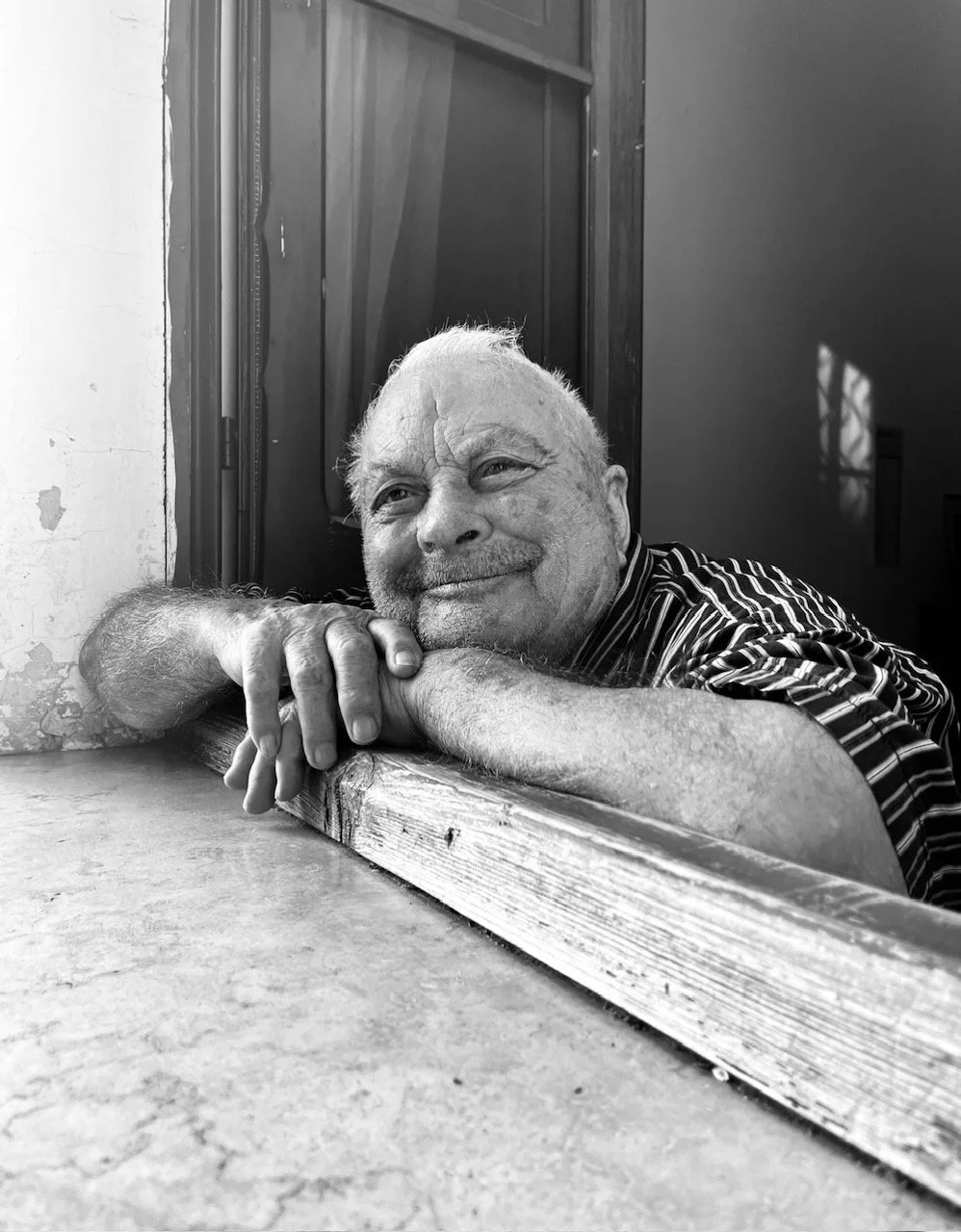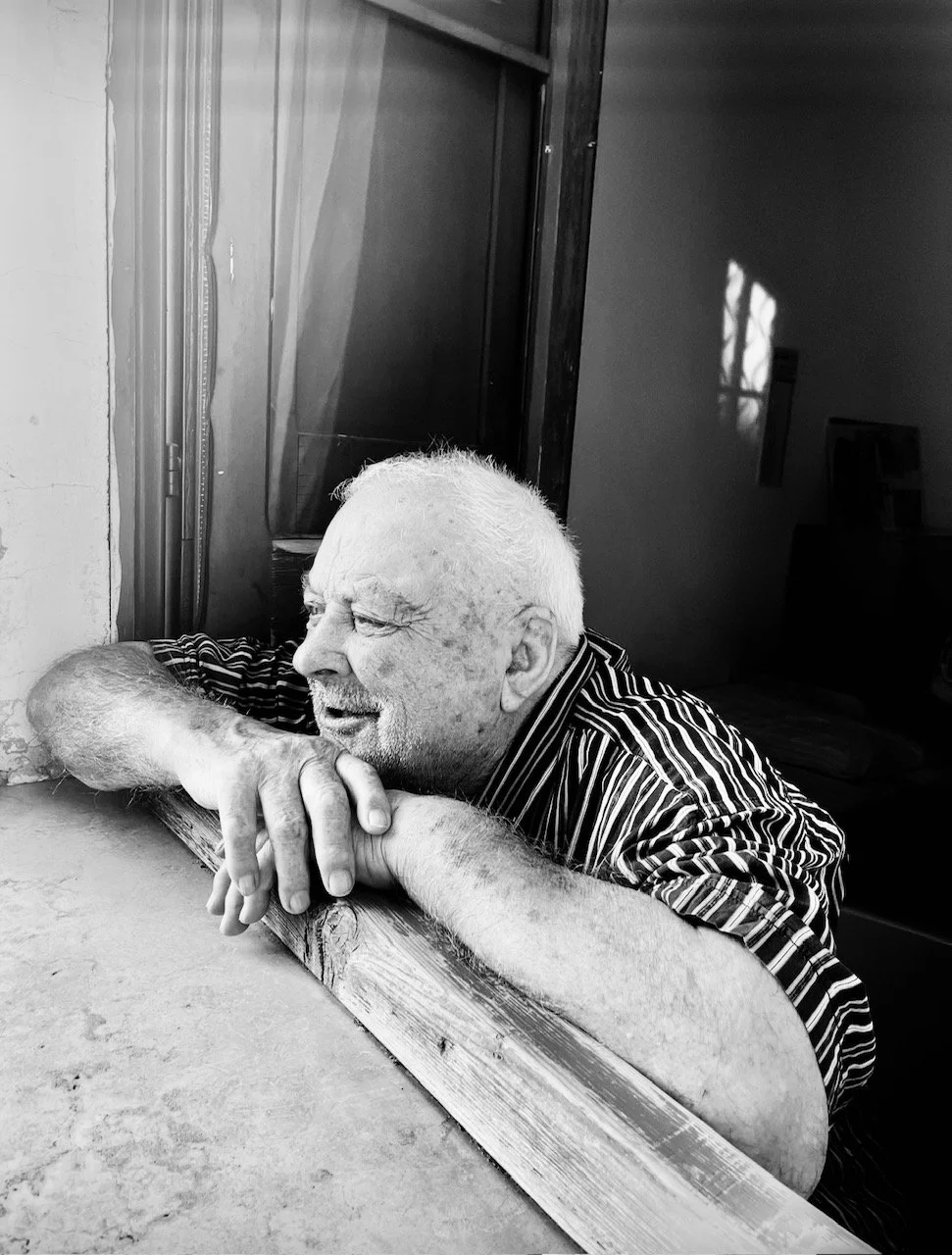Remembering Rocco: A Life Shared Through an Open Window
There were times during those long summers in the southern Italian town where my grandfather was born when my heart soared at a singular sight.
I’d be strolling stroll down Pomarico’s main drag, the Via Garibaldi, past Bar Centrale, with its strings of beads that hung in the doorway like a colorful curtain, en route to visit my namesake cousin, 86-year-old Giovanni Glionna, who lived on the far side of town from my tiny flat.
I began my search for the telltale sign along a row of apartments — the open street-level window, the billowing white fabric curtain knotted in place, held fast against the stifling sirocco winds — that told me he was there, that this was my lucky day.
I’d get to see my friend Rocco.
Rocco Montano, a man who’d spent most of his life, before farm tractors and zoom-zoom Maseratis, commanding a trusted mule, commuting to his grape fields miles outside town.
Now framed by that tiny threshold, his aging features still beamed like the summer moon on a cloudless night, his smile revealing those few stubborn remaining teeth. We were at eye-level; me standing on the sidewalk, he in his old wooden chair at the sill, often leaning against the unvarnished wooden frame.
By then, his hair had gone white, whiskers unshaven, fingers thick, hands earth-worn and covered in age spots and he moved slowly on his metal walker. Confined to his apartment, his wife now dead, he was no longer able to join the other pensioners who gathered on the benches around town.
He wasn’t there every day. Sometimes, the window was pulled shut, the white curtains hanging in place. And I sighed to myself and went about my way.
But most days I’d give his hand a vigorous shake and Rocco reciprocated, squeezing back with a powerful grip of a lifelong peasant farmer whose life reflects that of my own ancestors and southern Italy itself.
Those visits now seem like a lifetime ago. The other day, Rocco passed away at the age of 100.
Rocco’s Italy cannot be found in the museums of Florence, among treasures shaped by the exquisite touch of da Vinci and Michelangelo. His hands were gnarled and muddied from a lifetime of planting the dark red grapes known as primitivo, that were good for making local wine.
Working the land; that was his art.
The men of his era were peasant-farmers from the agrarian south — that other Italy — dirt-poor and uneducated, a land with a long history of witch’s spells and pagan gods, free of such northern Italian conceits as God-given purpose and pedigree.
Who knows what Rocco thought of the American who spoke halting Italian and zero local dialect, his lingua franca. But we made do. I may have been the only foreigner he’d ever met, so sheltered was his life in this isolated little town in the nation’s poorest province, Basilicata.
At each meeting, we sought meaningful contact, like those two touching fingers depicted in the Sistine Chapel, the creator reaching out to form Adam, a mere mortal. Those visits were like my daily blessings.
For those few lingering moments, I listened as Rocco reminisced about his lost world, how he attended school in an old palace in the middle of town once inhabited by former dukes and landowners. He even remembered the name of his teacher: Matteo Giordano.
After completing the third grade, Rocco joined his father in the fields ten miles outside town. He’d ride his mule there each day, setting out before the sun rose and not returning home until well after dark.
He and his wife, soft-spoken Antonia, had three children; Vincenzo, Giorgio and Angela. Giorgio helped out his father for a time before finding his own path. After that Rocco became more solitary, especially after his beloved Antonia died in 2017.
Looking back, perhaps Rocco was a stand-in for my own long-dead grandfather, a man I never knew, who in 1905 left Pomarico at age 17, rarely to return. He imparted the hard-won experience and quiet wisdom that my own ancestor never could.
Months before Rocco’s death, his children had moved him into a care facility. A video clip shows him blowing out the single candle on the cake that marked his century of. He wears a sweater and a jaunty cap and claps his hands as people cheer.
But my most precious image of Rocco will always be in that window, the sun on his face, the shadows of his darkened apartment relegated to the background, as he watched his world slowly pass him by.
Most of my time in Pomarico was spent in the old historic part of town, the Centro Storico, in a piazza surrounding the town’s towering 18th Century Catholic church.
Every evening, after the surrender of the day’s infernal heat, the place would blossom into the full theater of small-town Italian life. The piazza pulsed with an easy rhythm, distinct to this one place, featuring men, women, children, families and young couples — all joined together to act out and interact, see and be seen, show off and watch the show. In the square, everything and nothing happens — together, all at once.
As darkness slowly settles in, groups gather and dissolve, exchange jokes and gossip, and perhaps mutter a veiled insult. People sit, stand, walk, loiter, smile, emote, eat and drink. The next evening, they do it all over again. Residents will have it no other way; this is their place.
My favorite actors of this nightly passion play are the old retirees, their peasant roots dating back generations, who congregate with their canes and soft-spoken grace, to witness the latest unfurling of an unfamiliar modern world.
The times have delivered baffling internet technology that consumes their grandchildren and runaway immigration from African nations most cannot find on a map. Huddling together, like conspirators from the past, somehow lets their old world linger on a little longer.
At least they have one another. But not Rocco. From his window perch, he faced his diminished world far from Pomarico’s evening’s pageantry, like he did all those years working the land, all by himself, his old mule nearby for company.
He no doubt faced the fact that despite all of our human company, the people we seek out, and those who seek out us in return, we all remain finally, absolutely, alone.
Maybe that’s what drew me to him.
On my website, www.johnglionna.com, I once posted several pictures of Rocco that soon made their way onto social media, among a series of photographs I hoped would capture the presence of Pomarico’s vanishing oldest generation.
One day in town I ran into Rocco’s son Georgio. He’d seen my pictures online and thanked me for my relationship with his father, for seeing him.
A U.S. friend had a different take. He asked whether there were, in fact, any young people in Pomarico. They are here, I responded, moving in their own alternate universe, but I am I not so drawn to them.
My interest lies in the ancients like Rocco and those wisecracking pensioners who populate the benches. They’re men who have endured a brutal southern Italian country life largely without malice or bitterness. They’re the ones who keep the secrets to this place. In their own way, they are a living connection to the past.
Once they go, the mystery, that timeless sense of decency and grace, will go with them.
Rocco is now absent from his window, along with that smile and daily gift: the sense of inner peace he radiated each time we met. Because his was a life well lived.
And he’s no longer alone. If you believe in such things, and Italians certainly do, Rocco has been reunited with his Antonia. Still, Pomarico has lost yet another spinner of tales, those softly-told but spirited stories.
It has lost Rocco’s voice.




